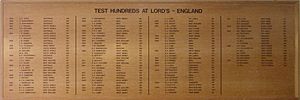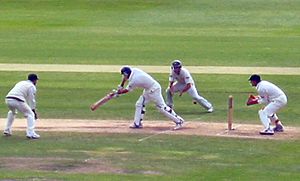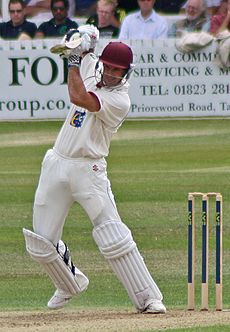Andrew Strauss facts for kids
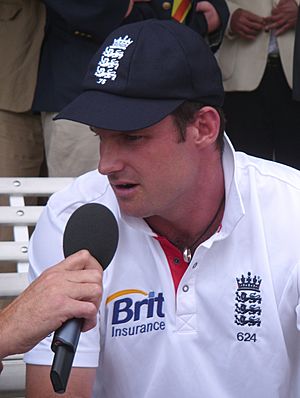
Strauss being interviewed at the end of the Lord's Test match v Pakistan in August 2010
|
||||||||||||||||||||||||||||||||||||
| Personal information | ||||||||||||||||||||||||||||||||||||
|---|---|---|---|---|---|---|---|---|---|---|---|---|---|---|---|---|---|---|---|---|---|---|---|---|---|---|---|---|---|---|---|---|---|---|---|---|
| Full name |
Andrew John Strauss
|
|||||||||||||||||||||||||||||||||||
| Born | 2 March 1977 Johannesburg, Transvaal Province, South Africa |
|||||||||||||||||||||||||||||||||||
| Height | 5 ft 11 in (1.80 m) | |||||||||||||||||||||||||||||||||||
| Batting | Left-handed | |||||||||||||||||||||||||||||||||||
| Bowling | Left-arm medium | |||||||||||||||||||||||||||||||||||
| Role | Opening batsman | |||||||||||||||||||||||||||||||||||
| International information | ||||||||||||||||||||||||||||||||||||
| National side |
|
|||||||||||||||||||||||||||||||||||
| Test debut (cap 624) | 20 May 2004 v New Zealand | |||||||||||||||||||||||||||||||||||
| Last Test | 16 August 2012 v South Africa | |||||||||||||||||||||||||||||||||||
| ODI debut (cap 180) | 18 November 2003 v Sri Lanka | |||||||||||||||||||||||||||||||||||
| Last ODI | 26 March 2011 v Sri Lanka | |||||||||||||||||||||||||||||||||||
| ODI shirt no. | 14 | |||||||||||||||||||||||||||||||||||
| T20I debut (cap 9) | 12 June 2005 v Australia | |||||||||||||||||||||||||||||||||||
| Last T20I | 15 March 2009 v West Indies | |||||||||||||||||||||||||||||||||||
| Domestic team information | ||||||||||||||||||||||||||||||||||||
| Years | Team | |||||||||||||||||||||||||||||||||||
| 1998–2012 | Middlesex | |||||||||||||||||||||||||||||||||||
| 2011 | → Somerset (on loan) | |||||||||||||||||||||||||||||||||||
| 2002 | Marylebone Cricket Club | |||||||||||||||||||||||||||||||||||
| 2007/08 | Northern Districts | |||||||||||||||||||||||||||||||||||
| Career statistics | ||||||||||||||||||||||||||||||||||||
|
||||||||||||||||||||||||||||||||||||
|
Source: ESPNcricinfo, 30 October 2017
|
||||||||||||||||||||||||||||||||||||
Sir Andrew John Strauss (born 2 March 1977) is a famous English cricket administrator and former player. He used to play for the England team and was even their captain! Andrew was a left-handed opening batsman, which means he started the batting for his team. He was also great at catching the ball in the field.
After retiring from playing, Andrew became the Director of Cricket for the England and Wales Cricket Board (ECB). He was given a special honour, becoming a Knight Bachelor, for all his hard work in English cricket.
Contents
- Early Life and School
- Personal Life and Family
- Playing Career
- Starting in County Cricket
- International Debut (2003–2004)
- Road to the Ashes (2004–2005)
- The Ashes (2005)
- Facing Asian Teams and Early Captaincy (2005–2006)
- Decline in Form and Comeback (2006–2008)
- Becoming England Captain (2009)
- The Ashes (2009)
- Later Career and Retirement (2010–2012)
- The Ashes (2010–2011)
- 2011 World Cup
- Retirement from All Cricket
- Life After Playing
- Images for kids
- See also
Early Life and School
Andrew Strauss moved to the UK when he was six years old. He went to two schools: Caldicott School and Radley College. Both are well-known schools in England.
He then studied economics at the University of Durham. While there, he played cricket for the university team. He also played rugby for a while! His coach, Graeme Fowler, eventually convinced him to focus only on cricket. Andrew graduated in 1998.
Personal Life and Family
Andrew Strauss spent some time in Australia early in his career. There, he met his future wife, Ruth McDonald. They got married in 2003 and had two sons, Sam and Luca.
Sadly, Ruth passed away in December 2018 after battling a rare form of lung cancer. After her death, Andrew started the Ruth Strauss Foundation. This charity helps people affected by lung cancer. They also have a special "Red for Ruth Day" at Lord's cricket ground. Everyone wears red to support the charity.
Andrew is also the President of the Primary Club Juniors. This charity helps fund cricket for blind people. He even played a blind cricket game once, wearing a blindfold!
He has many nicknames, like Straussy and The General. In 2011, he received an award called the Officer of the Order of the British Empire (OBE). Later, in 2019, he was made a Knight. This means he is now called "Sir Andrew Strauss."
Andrew has written several books about his cricket career. He also supports the Conservative political party.
Playing Career
Starting in County Cricket
Andrew Strauss started playing for the Middlesex team in 1998. He scored 83 runs in his very first game! He slowly got better each year.
By 2002, he became the captain of Middlesex. He held this role until the end of the 2004 season. In 2011, he scored his highest ever runs in a first-class game, making 241 not out.
International Debut (2003–2004)
Andrew first played for England in a One Day International (ODI) game in Sri Lanka in 2003. His big break came in 2004. He made his Test match debut at Lord's against New Zealand.
He scored 112 runs in his first innings and 83 in the second! This was amazing for a debut. He was named "man of the match" for his great performance. He was only the fourth batsman to score a century at Lord's on his debut.
Andrew continued his great form in his first overseas Test match in South Africa. He nearly scored two centuries again, making 126 and 94 not out. He quickly became a key player for England.
Road to the Ashes (2004–2005)
After his amazing start, Andrew continued to play well. He scored his first ODI century against the West Indies at Lord's. He also scored another Test century against the West Indies.
In late 2004, England toured South Africa, Andrew's home country. He had a fantastic series, scoring 126 in the first Test. He also scored 136 in the Boxing Day Test. He ended the series with 656 runs, the most by any player. This earned him his first "Man of the Series" award.
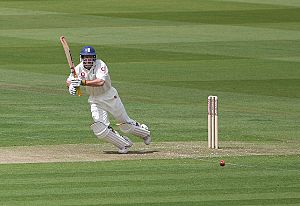
Before the famous 2005 Ashes series, Andrew played well against Bangladesh and Australia. He scored a high of 152 runs in an ODI against Bangladesh.
The Ashes (2005)
The 2005 Ashes series against Australia was very exciting. England had not won the Ashes since the 1980s. Andrew Strauss played a big part in England's success.
In the second Test, he scored 48 runs. England won this match by just two runs! In the third Test, he scored 106 runs. This helped England secure a draw.
In the fourth Test, Andrew made 35 runs and took two important catches. One catch, to dismiss Adam Gilchrist, was called "the abiding image of the Summer." England won this match and took the series lead.
In the final Test, Andrew scored 129 runs. This was his second century of the series. England won the match and the series 2–1. This meant England won the Ashes for the first time in 18 years!
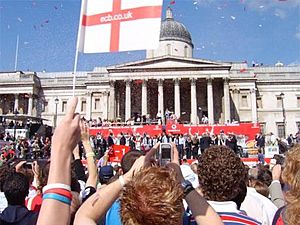
Andrew was one of England's top scorers in the series. He was also the only player to score two centuries. For his efforts, he and the rest of the team received special awards.
Facing Asian Teams and Early Captaincy (2005–2006)
After the Ashes win, England toured Pakistan and India. Andrew had some ups and downs with his batting. In India, he opened the batting with a young Alastair Cook.
When regular captain Michael Vaughan was injured, Andrew was given the chance to lead the England ODI team. He captained England to a win against India.
Later, in 2006, Andrew was made the official Test captain for the series against Pakistan. He scored another century at Lord's, making 128 runs. England won the series 3–0 under his leadership. He was named "Player of the Series."
There was a controversial moment in the fourth Test, known as "Ovalgate." The umpires thought the ball had been tampered with. The Pakistan team protested, and the match was eventually forfeited by Pakistan.
Decline in Form and Comeback (2006–2008)
After a great period, Andrew's batting form dropped in 2006 and 2007. He struggled during the Ashes series in Australia, which England lost 5–0. He was even hit on the head by a fast ball from Brett Lee.
Because of his poor form, Andrew was left out of the Test squad for a tour of Sri Lanka. He decided to take a break from cricket.
However, he was recalled for the tour of New Zealand in 2008. He struggled at first but then scored a fantastic 177 runs in the third Test. This was his highest score in Test cricket and helped him regain his confidence.
He continued his good form against New Zealand at home, scoring 63 and 106. He was named England's "man of the series" for his 266 runs.
Becoming England Captain (2009)
Andrew Strauss was officially appointed England captain in January 2009. This happened after some disagreements between the previous captain and coach.
In his first series as captain, against the West Indies, England lost. However, Andrew had a great series with the bat, scoring three centuries. He made 541 runs in total.
He then led England to home victories against the West Indies in both Test and ODI series.
The Ashes (2009)
In 2009, England aimed to win back the Ashes from Australia. Andrew Strauss played a crucial role as captain.
In the second Test at Lord's, Andrew batted for the entire first day, scoring 161 runs. This was the highest score by any player in the series. England went on to win this match comfortably.
In the final Test at The Oval, Andrew scored 55 and 75 runs. He also made a brilliant run-out to dismiss Michael Clarke. England won the match and the series 2–1, bringing the Ashes home!
Andrew was named England's "man of the series" by the Australian coach. He scored 474 runs, more than any other player from either team. He was also included in the World Test XI by the ICC.
Later Career and Retirement (2010–2012)
After the 2009 Ashes, Andrew continued to lead England. He scored a career-best 154 runs in an ODI against Bangladesh in 2010.
The Ashes (2010–2011)
Andrew Strauss led England to Australia for the 2010–11 Ashes series. He hoped to become one of the few England captains to win the Ashes both home and away.
In the first Test, he scored 110 runs. His opening partner, Alastair Cook, scored an amazing 235 not out. England drew this match.
In the second Test, Andrew scored only 1 run, but England won by an innings. In the third Test, England lost.
However, in the Boxing Day Test at the MCG, England bowled Australia out for just 98 runs. Andrew scored 69 runs, passing 6,000 Test runs. England won this match by an innings, which meant they had retained the Ashes!
In the final Test in Sydney, Andrew scored 60 runs. England won by another innings, securing a 3–1 Ashes victory. This was a historic win for England.
2011 World Cup
Andrew captained England in the 2011 Cricket World Cup. He scored 88 runs against the Netherlands. He then scored an impressive 158 runs against India, leading to a thrilling tie.
England had some tough matches, including a shock defeat to Ireland. Although they reached the quarter-finals, they were beaten by Sri Lanka. After the World Cup, Andrew stepped down as the ODI captain and retired from One Day International cricket.
Retirement from All Cricket
Andrew Strauss announced his retirement from all forms of cricket on 29 August 2012. This was after playing 100 Test matches. His teammates gave him 100 bottles of wine as a thank you gift! Alastair Cook, his opening partner, took over as the new Test captain.
Life After Playing
In 2015, Andrew Strauss became the Director of England Cricket for the ECB. In this role, he helped make important decisions about the England team. He oversaw the appointment of Trevor Bayliss as coach. He also encouraged more focus on limited overs cricket.
Andrew resigned from his role in October 2018 to spend more time with his wife, Ruth, during her cancer treatment.
Images for kids
See also
 In Spanish: Andrew Strauss para niños
In Spanish: Andrew Strauss para niños
 | Kyle Baker |
 | Joseph Yoakum |
 | Laura Wheeler Waring |
 | Henry Ossawa Tanner |


